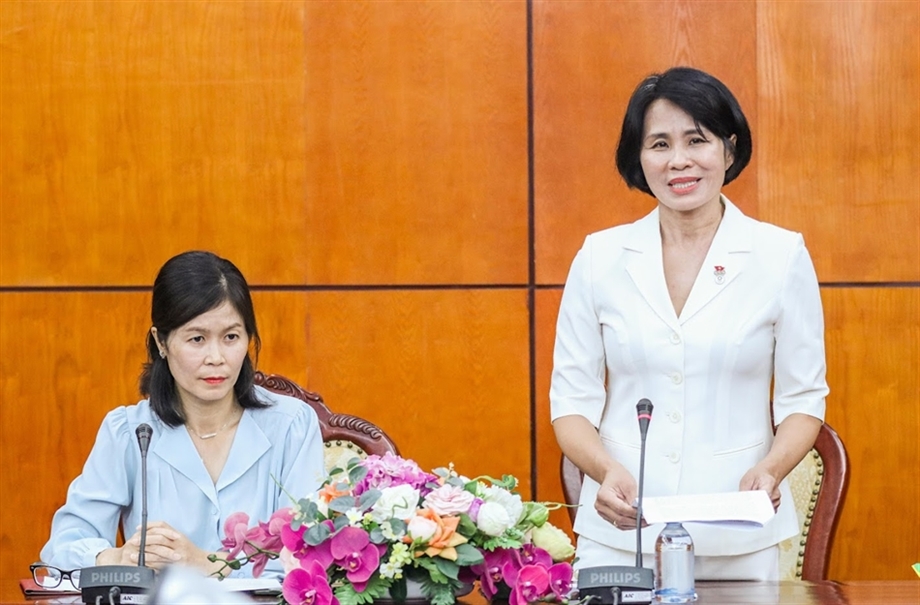The Sports Authority of Viet Nam (SAV) held a discussion about gender equality in sports on June 30 to honor and highlight the importance of women, especially Vietnamese women, and their contribution to the national sport.
Entitled "Sports and women in the new era of rising up, eyeing sustainable development” the discussion featured managers, businesswomen, former and current athletes, coaches, sport-related people as well as journalists in Ha Noi.
Addressing in the event, SAV Deputy Director Le Thi Hoang Yen said: “Viet Nam will host the eighth ASEAN Sports Ministers Meeting (AMMS 8) and the 16th ASEAN Senior Sports Officials Meeting (SOMS 16) in October.
“During these two main meetings, the fifth ASEAN + Japan Sports Ministers Meeting (5th AMMS + Japan) and the 8th ASEAN + Japan Senior Sports Officials Meeting (8th SOMS + Japan) will also take place.”
In these important conferences, Viet Nam, Japan and ASEAN countries would focus on enhancing cooperation until 2030 through sports in projects to promote the participation of women and girls in sports, physical education teacher education (PETE), and students with disabilities (SPD); ASEAN Sports Plan 2026-2030. And also, Japan would update the progress and future directions in the ASEAN-Japan sports cooperation framework.
The Gender Equality in Sports Project focusing on promoting the participation of women and girls is one of Japan's key and prominent projects with ASEAN countries, in which Viet Nam are the active participant.
Since 2023, SAV has closely coordinated with Japanese Seijo University -- the focal point authorized by Japan's central sports management agency to implement the Gender Equality in Sports Project in the ASEAN region.
Up to now, with the efforts of all levels of government and departments’ leaders, the gender inequality in sports has remarkably changed. People, sport audiences and society have paid much more attention to female athletes after their outstanding successes.
The June 30 discussion was also part of the ASEAN-Japan Gender Equality Project to eliminate gender barriers and prejudices in sports in ASEAN countries. Viet Nam highly appreciated the cooperative efforts between ASEAN and Japan in developing sports for all in the region in general and for Viet Nam in particular.
"Women play an important role in the development of the country's sports and improving the quality of people's lives. Recently, the outstanding achievements of women's teams and athletes have made Viet Nam known widely in the international arena,” said SAV Deputy Director Le Thi Hoang Yen.
“They are the national women's football team, women's volleyball squad, runner Nguyen Thi Oanh, swimmer Nguyen Thi Anh Vien and badminton player Nguyen Thuy Linh.”
She added that the issues discussed in this meeting would effectively contribute to the progress of the gender equality project in sports in Viet Nam, an active member of ASEAN.
It would also help enhance the connection and understanding between ASEAN and Japan and create an image of a dynamic, integrated and sustainably developing ASEAN in the international arena. The regional countries would confidently stand side by side with other the sport powerhouses of the continent in the future.
Taking part in the discussion, runner Nguyen Thi Oanh told her emotional sport journey. The rural girl from Bac Giang Province overcame many difficulties to become the one of top athletic athletes in Viet Nam and a well-known runner in the Southeast Asia.
Nguyen Thi Oanh said to achieve successes she got over gender prejudices among many challenges to follow professional sport and shine.
She said each woman should choose a suitable sport to practice to be healthy, beautiful, and more confident in work and life.
Tran Thuy Chi, chairwoman of the Board of Directors of Vietcontent Company, said the world statistics showed that 60 per cent of female athletes met difficulties to find jobs after retirement and 70 per cent faced with financial problems.
Therefore, it was necessary to find solutions, a specific policy mechanism for example, to support retired female athletes. They should be trained, have a suitable working environment, and participate in the sport economic market after retirement.
Also at the discussion, Deputy General Secretary of the Viet Nam Football Federation (VFF) Nguyen Thanh Ha said gender equality received attention and was promoted in football in Viet Nam.
Many policies for developing young female players were implemented by the VFF, AFC and FIFA.
After retirement, many female players worked as referees and coaches. Some of coaches secured the Professional Coaching Diploma, the highest level of coaching accreditation offered by the Asian Football Confederation (AFC). Some Vietnamese FIFA female referees were assigned to officiate in international elite tournaments organised by AFC and FIFA.
In the successful June 30 discussion delegates agreed that women were not only strong participating athletes but also great contributors to sports.

Deputy Director of the Sports Authority of Viet Nam Le Thi Hoang Yen (right) takes charge of the discussion.
The support, investment and practical companionship from individuals, groups, state management agencies, business and organizations would be strong foundation to pave the way for many generations of women to push their physical development and reach success.